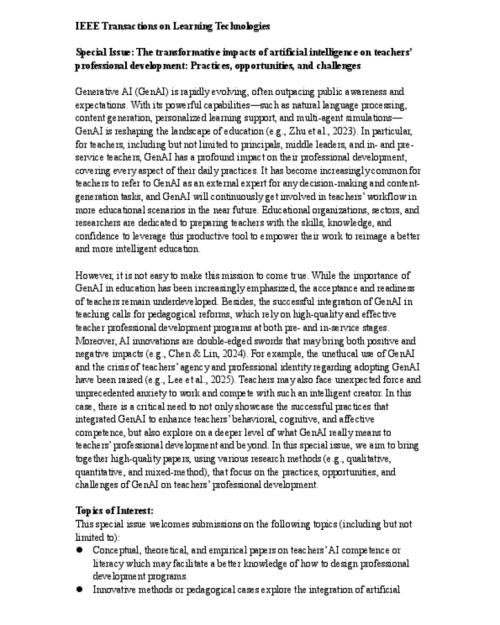Scope
The IEEE Transactions on Learning Technologies covers all advances in learning technologies and their applications, including but not limited to the following topics: innovative online learning systems; intelligent tutors; educational games; simulation systems for education and training; collaborative learning tools; learning with mobile devices; wearable devices and interfaces for learning; personalized and adaptive learning systems; tools for formative and summative assessment; tools for learning analytics and educational data mining; ontologies for learning systems; standards and web services that support learning; authoring tools for learning materials; computer support for peer tutoring; learning via computer-mediated inquiry, field, and lab work; social learning techniques; social networks and infrastructures for learning and knowledge sharing; and creation and management of learning objects.
Description
The articles in this journal are peer-reviewed in accordance with the requirements set forth in the IEEE Publication Services and Products Board Operations Manual. Each published article was reviewed by a minimum of two independent reviewers using a single-anonymous peer-review process, where the identities of the reviewers are not known to the authors, but the reviewers know the identities of the authors. Articles will be screened for plagiarism before acceptance.
TLT publishes archival research papers and critical survey papers. A paper must either describe original research or offer a critical review of the state of the art in a particular area. Papers concerned with the evaluation of technology are only appropriate if the technology itself is novel or if significant technical insights are provided.
TLT is somewhat unique among educational technology journals given our dual-discipline focus on CS (computer science) and LDTech (Learning design and technology). In order to be considered for publication in TLT, articles must make substantive technical and/or design knowledge in the development of learning technologies as well as convincingly demonstrate how the technologies can be used to support learning.
For articles whose main intended contributions relate to curriculum, pedagogy, assessment, and/or other aspects of education in electrical and electronics engineering, computer engineering, computer science, and other fields within the scope of interest of IEEE, authors should instead consider submission to TLT’s sister journal, the IEEE Transactions on Education.
Want to Join TLT's Editorial Board as a Reviewer?



